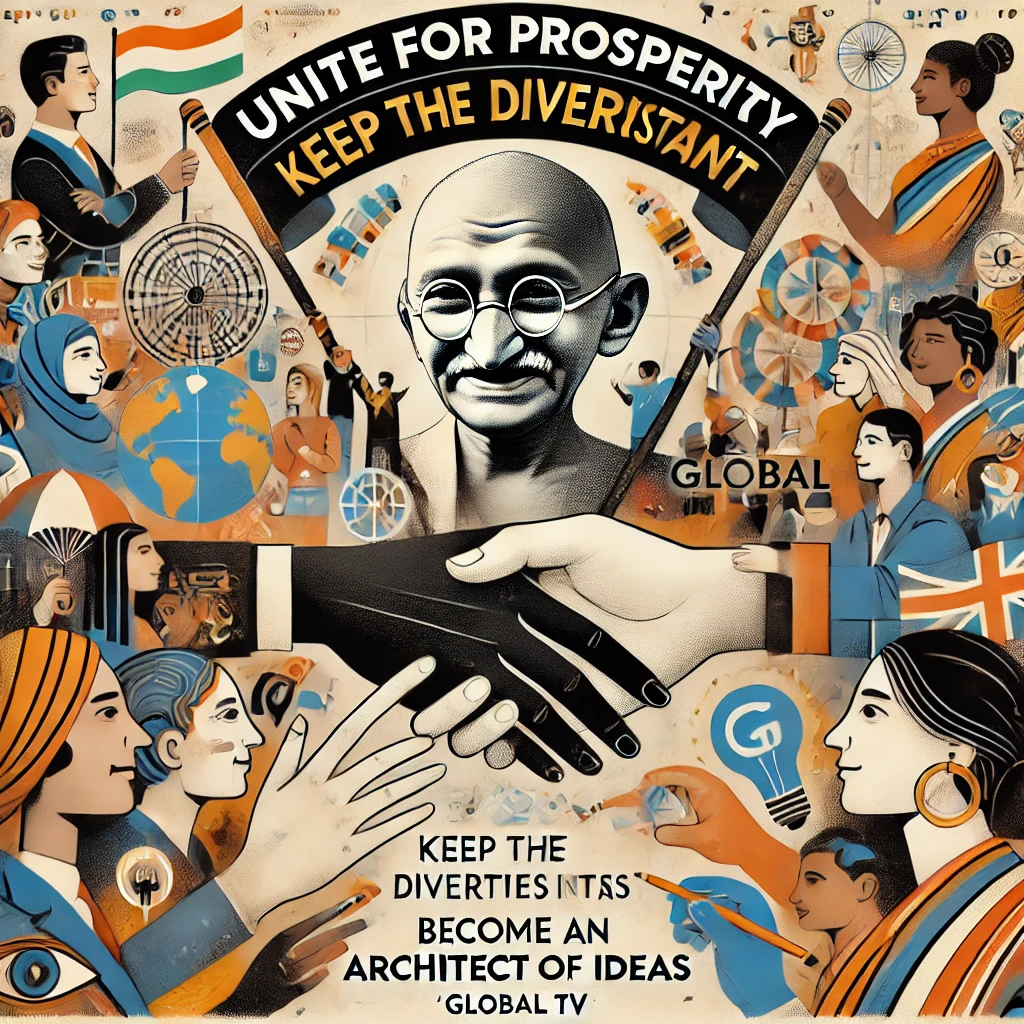Unite for Prosperity, Keep the Diversities Intact, Become an Architect of Ideas | Global TV
NV Paulose, Chairman, Global TV +91 98441 82044
Mahatma Gandhi, the visionary leader who spearheaded India’s independence movement, was not merely a political strategist. He was an Architect of Ideas, whose profound understanding of human nature and societal structures continues to inspire generations. Gandhi’s brilliance was most visible through initiatives like the Salt Satyagraha, where he united Indians across social, economic, and regional lines, demonstrating that collective action could dismantle even the mightiest of empires. Yet, his legacy goes far beyond political freedom; it extends to a vision of inclusive prosperity, equity, and unity. These are ideals that India, and the world, can still draw from today. No human is a liability today.

Gandhi’s Vision: A Society Built on Equality and Self-Sufficiency
At the heart of Gandhi’s ideas was a rejection of colonial exploitation and the associated theories of scarcity that kept nations dependent on external funding and economic mitigation. Funding is actually a means exploitation even today for so called advanced nations over other nations. Economic sanctions are imposed to make nations to heed to the demands of the big player nations. Our resources are drained out and our work forces are paid insignificantly low by using many of the economic theories that are based on the principles of scarcity.
Gandhi proposed the theory of abundance, which celebrated the vast potential of human and natural resources. His philosophy can be likened to the dynamics of a beehive, where each bee contributes to the whole, resulting in a surplus that benefits all. In this model, capabilities of the citizens drive growth. United they prosper and isolated everyone drain out and die in the one man’s island.

Gandhi’s emphasis on self-sufficiency was more than just a call to resist foreign goods; it was a blueprint for an economy where local initiatives and community driven efforts would create sustainable wealth. True happiness, according to Gandhi, could only be found through inner fulfillment and shared prosperity, not through the amassing of material wealth. We should become human beings with humanitarian value systems and compassionate human nature. Wealth shared are the wealth multiplied. We should learn the art of creating shared wealth. We can create any amount of wealth when we all become the Architects of Ideas. Work on an idea that can create wealth and share it equitably to the stakeholders. Can we keep transparency in our proceedings and add value to the existing wealth?
The Relevance of Gandhi’s Ideas Today
India, like much of the world, faces unprecedented challenges. Rising inequality, hunger, unemployment, and environmental degradation. In addressing these issues, Gandhi’s vision offers valuable lessons. Today’s politicians are all united and one with each other in degenerating wealth and to share its outcome in the form of foreign investments. They do not understand things beyond infrastructure and modern buildings. Luxury has to be tangible for them and they all believe as they are going to be in the limelight for centuries. Even their children disrespects them since they are aware of their true colours and sources of wealth.
India needs Architects of Ideas, who can combine the principles of inclusivity, social cohesion, and sustainability to build a prosperous future. These visionaries must recognize the strength in India’s diversity. They should ensure every person with prosperity and respect. Everyone is valued, heard, and uplifted.
Cultural, linguistic, and religious diversity is its greatest strength of India. Gandhi knew this. His notion of Sarvodaya is presented even today in many forms. The welfare of all but remain in false promises. For Gandhi, it was not merely a slogan but a deeply held conviction that true progress comes when no one is left behind. Every human being is a wealth of capabilities. We should create avenues and opportunities for people to take part in the process of wealth creation.
Key Principles for Modern Architects of Ideas
Inclusive Economy: Today’s leaders must ensure that opportunities are not restricted to a privileged few but available to all, irrespective of socio-economic status, caste, gender, or background. This requires systemic changes in policy and attitude, with an emphasis on creating equitable access to education, healthcare, and employment. We should avoid all kinds of disparities in the world.
Collective Growth: Just as Gandhi emphasized self-sufficiency for villages, the modern economy should focus on collective growth. Collaboration across sectors should become informal, flexible and collective. Whether in agriculture, industry, or technology, we should encourage people to build an economy that benefits all. Mutual support within communities, and between communities, strengthens the fabric of society. Let people be unified for the purpose of prosperity for all.
Social Cohesion: Gandhi was deeply committed to unity, even in the face of vast differences. Social cohesion remains essential in a world increasingly divided by ideology, ethnicity, and economics. By fostering dialogue, understanding, and equality, India can retain its diversity while shaping various paths to prosperity. What can be done together for all should be our appreciative inquiry.
Self-Sufficiency: Gandhi’s message of local empowerment rings true today. Localized production, sustainable agriculture, and the promotion of small and medium enterprises can counter the concentration of wealth in large corporations and reduce dependency on the unpredictable global markets.
Inner Happiness: Gandhiji understood that personal fulfillment comes from within, not from external wealth. Today’s Architects of Ideas must balance economic progress with well-being, ensuring that spiritual, emotional, and mental health are prioritized alongside material success. Mind matters a lot.
Uniting for Prosperity with Diversity at the Core
It is essential to harness the richness of India’s diverse communities. We should adopt Twin City campaigns and Twin District development models to unite our people for prosperity by keeping the diversities intact. Gandhi’s vision was one where harmony thrived not in uniformity, but in the respectful coexistence of differences. The future leaders and Architects of Ideas must embrace the concept of using diversity as a resource for innovation, and collective problem-solving.
Becoming an Architect of Ideas: A Call to Action
The call to action is clear: India, and indeed the world, needs individuals who can think beyond personal gain and envision a future where prosperity is shared, diversity is celebrated, and collective effort is valued over individual success. Gandhi’s legacy provides a guiding light. His ideas remain relevant, especially for those who wish to transform society through thought, action, and leadership.
To become an Architect of Ideas, one must first recognize the potential in every person, every community, and every idea. It requires deep understanding of the interconnectedness of humanity, and the courage to challenge the status quo. Let us work for the greater good even in the face of opposition.
By embracing the principles of inclusion, self-sufficiency, social cohesion, and collective happiness, today’s visionaries at the district level can build a world around them where prosperity is a shared reality, not a distant dream. In doing so, they will honour the spirit of Gandhi, uniting people in a common quest for a brighter, more equitable future where all can thrive, and none are left behind.
Gandhiji had inspired a nation to unite for freedom. Modern Architects of Ideas should inspire a generation to unite for prosperity. Let us be united in keeping the beauty of our diversity intact. Let us create wealth and share it with all.





